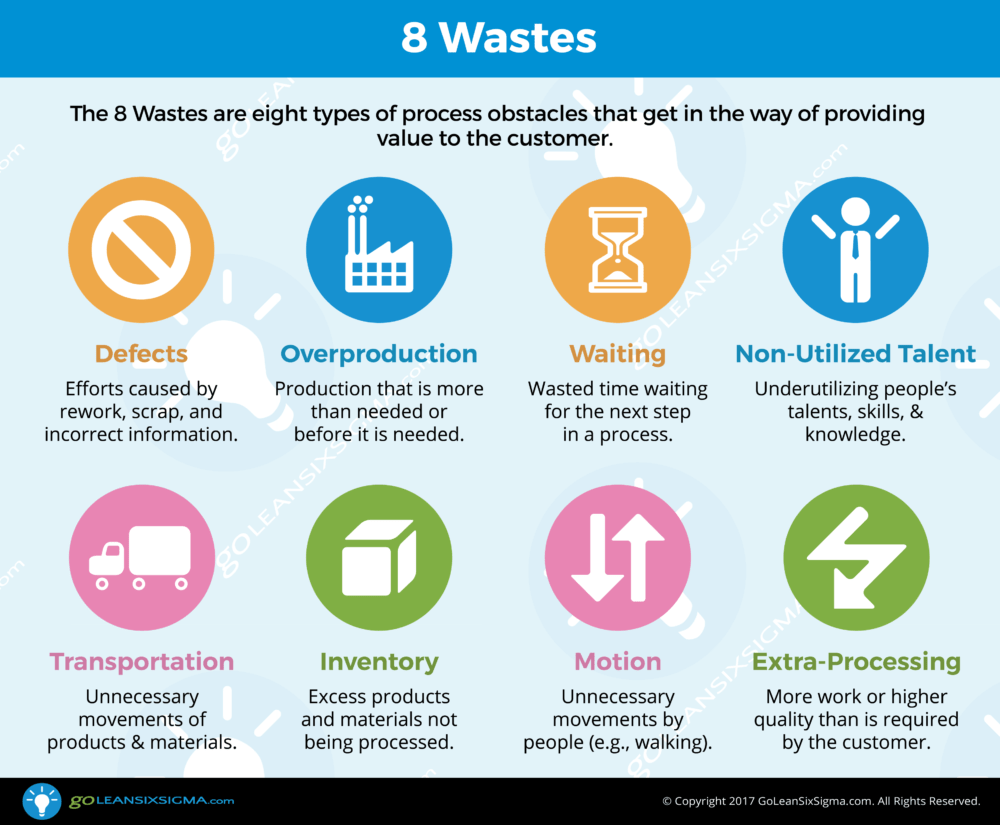Chasing Waste From Your Operation for Better Compost & Profit
Print this Article | Send to Colleague
 |
|
| John Janes |
waste (v.): to consume, spend, or employ uselessly or without adequate return; use to no avail or profit; squander: to waste money; to waste words.
In the highly competitive world of compost production, chasing waste is necessary for the immediate and long-term health of the organization. Regardless of whether the facility is governmental or for-profit, the relentless pursuit of waste to assure the long-term health of the organization is necessary
Extracting waste out of a production process is a key role for production leaders. Though the concept is easy to understand, extracting waste out of a production process in many cases may require significant changes to the process.
There are eight typical wastes, as described in the graphic below provided by goleansixsigma.com. Let’s take a quick look one of these, a significant cost driver in composting operations - waiting.
Let’s look at inbound truck delivery:
- 80 yard load per trailer (one gallon of fuel burned per idle hour @ $3/gal)
- 10 trailers per 8-hour shift
- One loader with 6-yard bucket (one gallon fuel burned per idle hour @ $3/gal)
- Loaded labor cost of $20/hour
- Loader depreciation cost of $5/hour
- Loader preventive maintenance cost of $1/hour
Original Process
Loader operator is notified when a truck arrives. Loader operator drives three minutes to gate, takes four minutes to open gate, then drives three minutes back to inbound pile, then takes four minutes to secure the gate again. For each truck.
New Process
Trucks were given one of two entry times to the gate. The inbound pile as restructured to accept five loads at a time, therefore five trucks at a time. Loader operator only drives to the gate twice per day
Savings from New Process
- 14 minutes for the loader and loader operator, times 8 = 1.9 hours
- 200 workdays per year times 1.9 hours = 380 saved hours
- 380 saved hours times $3/hour fuel cost and $20/hour labor cost = $8,740 annual savings
Deferred Costs from New Process
Deferred costs are those costs that are not included in costs savings, but those costs that are pushed out in time.
- 380 hours times depreciation and PM costs of $6/hour = $2,280
- Total first 12 months reduction in inbound material costs ($8,740 + $2,280) = $11,020
As one can see from the above example, the opportunity to reduce costs in chasing waste can result in real savings without impacting operations. In many cases, the resulting savings also generate positive operational outcomes such as increases in quality or throughput.
Our personnel are the only asset we have that appreciates in value over time, therefore it is imperative that we chase waste out of their experience.

This month’s leadership column comes from USCC Board Member John Janes of Caterpillar, where he heads up industry alignment to composting and green industries, as well as the training and education of new Caterpillar professionals. Click here for an additional resource on management principles.

